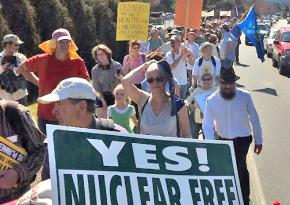Determined to close Vermont’s nuke
reports from Vermont on a show of protest against nukes.
POLICE ARRESTED 130 protesters during a 1,000-strong demonstration on March 22 to call for the immediate closure of the Entergy-owned Vermont Yankee nuclear power plant in the southeastern corner of the state.
The 40-year-old nuke's state license expired this week after the Vermont state Senate voted overwhelmingly in 2010 to close it down. But Entergy was successful in winning both a 20-year extension of its license from the Nuclear Regulatory Commission (NRC) and a federal court injunction overturning Vermont's decision to close the plant on March 21, 2012.
Organizers from the SAGE Alliance told a rally of more than 1,000 plant opponents outside the plant's corporate offices in Brattleboro, Vt., "Entergy's attempt to keep its aged, leaking, accident-plagued reactor operation in defiance of the expressed will of the Vermont legislature and the people of Vermont and the tri-state area is an unacceptable affront to democracy."
The rally followed a three-mile march to Entergy's local headquarters, where two dozen affinity groups from Vermont and neighboring states crossed police lines onto Entergy property, while hundreds chanted, "Shut it down, shut it down!"

Meanwhile, in New Orleans, the "New England National Guard" affinity group entered Entergy's corporate headquarters. After taping off a crime scene, the protesters demanded an interview with CEO J. Wayne Leonard. The eight demonstrators called into a cheering Vermont rally. "Our simple trespass is our statement of resistance to Entergy's corporate trespass with the continued illegal operation of this nuclear waste factory," said Brattleboro bookstore owner Nancy Braus.
THE NUCLEAR catastrophe in Fukushima has increased the movement's sense of urgency. Susan Miyake, who splits her year between Japan and Vermont, said, "Last year has been traumatic, with one disaster after another"--an allusion to both Fukushima and the devastating flooding in Vermont caused at the end of August when Hurricane Irene came inland.
Miyake said that she asks herself, "Which is more dangerous, living 100 miles from Fukushima or 10 miles from Vermont Yankee? Everyone in Japan now understands that power is a life-and-death issue. I've heard that line before [about the remote chance of an accident], and I know that small possibilities are too much."
This was the biggest protest against Vermont Yankee in decades, and veteran activists of the 40-year struggle figured prominently in the ranks of those marching. Many had been convinced that the state of Vermont would be able to close the plant on schedule, not believing that the NRC and the federal courts would overrule it.
There were also hundreds of younger protesters, horrified by Fukushima and buoyed by the Occupy movement. Christian, from Queens in New York City, joined the No More Fukushimas Peace Walk, which started at the Oyster Creek nuclear plant in New Jersey in early March.
With stops along the way at Occupy Wall Street and the Indian Point nuclear plant outside New York City, the walk was about drawing out the big picture, said Christian. "Walking from community to community is a way to connect the actual organizing going on around different nukes and to point out the systematic nature of the problem," he said.
Garye, who lives 10 miles from Vermont Yankee, said she was protesting because people's health is more important than the profits of the nuclear industry. "The half-life of the waste is hundreds of thousands of years, and that is not safe," she said. "I just want people to awaken to the dangers...We need to close down Vermont Yankee. I'm here out of hope."
Vermont Yankee is one of the oldest plants in the country, and it has been plagued by radioactive leaks and other equipment failures. There is strong popular support for closing the plant, and the large protest confirms the resolve of plant opponents.
But activists' hope that the Vermont legislature could succeed in closing the plant has been overrun by the NRC and the federal courts, with the tacit approval of the Obama administration. The path forward to winning is not clear.
After an inspiring day of action, questions remain about the how to link up regional anti-nuke movements, bring pressure to bear on the Obama administration and expand the movement to a size that is able to impact policies. In Germany and Japan, anti-nuke protests have pushed those governments toward abolishing their nuclear power industries. The March 22 day of action against Vermont Yankee will hopefully be remembered as a key step in the rebirth of a national anti-nuclear movement in the U.S.


